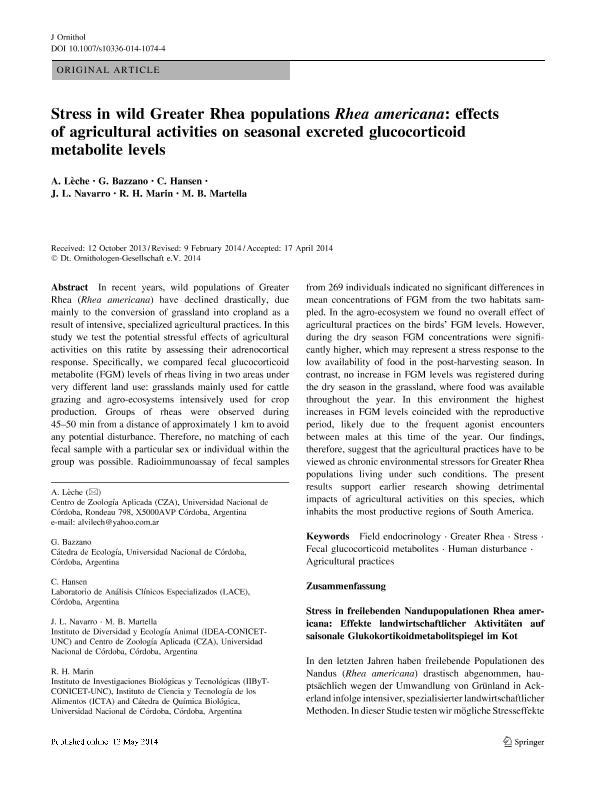Mostrar el registro sencillo del ítem
dc.contributor.author
Leche, Alvina

dc.contributor.author
Bazzano, Gisela del Valle

dc.contributor.author
Hansen, C.
dc.contributor.author
Navarro, Joaquin Luis

dc.contributor.author
Marin, Raul Hector

dc.contributor.author
Martella, Monica Beatriz

dc.date.available
2016-11-04T22:14:07Z
dc.date.issued
2014-05
dc.identifier.citation
Leche, Alvina; Bazzano, Gisela del Valle; Hansen, C.; Navarro, Joaquin Luis; Marin, Raul Hector; et al.; Stress in wild Greater Rhea populations: effects of agricultural activities on seasonal excreted glucocorticoid metabolite levels; Springer; Journal of Ornithology; 155; 4; 5-2014; 919-926
dc.identifier.issn
2193-7192
dc.identifier.uri
http://hdl.handle.net/11336/8015
dc.description.abstract
In recent years, wild populations of Greater Rhea (Rhea americana) have declined drastically, due mainly to the conversion of grassland into cropland as a result of intensive, specialized agricultural practices. In this study we evaluate potential stressfuleffects of agricultural activities on this ratite by assessing their adrenocortical response. Specifically, we compared fecal glucocorticoid metabolite (FGM) levels of rheas living in two areas under very different land use: grasslands mainly devoted to cattle grazing and agro-ecosystems intensively used for crop production. Radioimmunoanalysis of fecal samples from 269 individuals indicated no significant differences in mean concentrations of FGM according to habitat type. In the agro-ecosystem we found no direct effect between agricultural practice and the bird´s FGM levels. However, FGM concentrations were significantly higher during the dry season, which may represent a stress response to the low availability of forage due to harvesting. In contrast, no increase in the FGM levels was registered during the dry season in the grassland, where ample forage was available throughout the year. In this environment the highest increases in FGM levels coincided with the reproductive period, likely due to the frequent agonist encounters between males at this time of the year. Our findings therefore suggest that the consequences of agricultural practices may constitute a chronic environmental stressor for Greater Rhea populations living under such conditions. The present study support earlier research showing detrimental impacts of agricultural activities on this species, whose area of distribution coincides with the most productive regions of South America.
dc.format
application/pdf
dc.language.iso
eng
dc.publisher
Springer

dc.rights
info:eu-repo/semantics/openAccess
dc.rights.uri
https://creativecommons.org/licenses/by-nc-sa/2.5/ar/
dc.subject
Field Endocrinology
dc.subject
Greater Rhea
dc.subject
Stress
dc.subject
Fecal Glucocorticoid Metabolites
dc.subject
Human Disturbance
dc.subject
Agricultural Practices
dc.subject.classification
Conservación de la Biodiversidad

dc.subject.classification
Ciencias Biológicas

dc.subject.classification
CIENCIAS NATURALES Y EXACTAS

dc.title
Stress in wild Greater Rhea populations: effects of agricultural activities on seasonal excreted glucocorticoid metabolite levels
dc.type
info:eu-repo/semantics/article
dc.type
info:ar-repo/semantics/artículo
dc.type
info:eu-repo/semantics/publishedVersion
dc.date.updated
2016-11-02T18:14:12Z
dc.journal.volume
155
dc.journal.number
4
dc.journal.pagination
919-926
dc.journal.pais
Alemania

dc.journal.ciudad
Berlin
dc.description.fil
Fil: Leche, Alvina. Universidad Nacional de Cordoba. Facultad de Cs.exactas Fisicas y Naturales. Centro de Zoologia Aplicada; Argentina
dc.description.fil
Fil: Bazzano, Gisela del Valle. Universidad Nacional de Córdoba. Facultad de Ciencias Exactas, Físicas y Naturales; Argentina
dc.description.fil
Fil: Hansen, C.. Laboratorio de Análisis Clínicos Especializados; Argentina
dc.description.fil
Fil: Navarro, Joaquin Luis. Consejo Nacional de Investigaciones Cientificas y Tecnicas. Centro Cientifico Tecnologico Cordoba. Instituto de Diversidad y Ecologia Animal; Argentina
dc.description.fil
Fil: Marin, Raul Hector. Consejo Nacional de Investigaciones Científicas y Técnicas. Centro Científico Tecnológico Córdoba. Instituto de Investigaciones Biológicas y Tecnológicas; Argentina
dc.description.fil
Fil: Martella, Monica Beatriz. Consejo Nacional de Investigaciones Cientificas y Tecnicas. Centro Cientifico Tecnologico Cordoba. Instituto de Diversidad y Ecologia Animal; Argentina
dc.journal.title
Journal of Ornithology
dc.relation.alternativeid
info:eu-repo/semantics/altIdentifier/url/http://link.springer.com/article/10.1007/s10336-014-1074-4
dc.relation.alternativeid
info:eu-repo/semantics/altIdentifier/doi/http://dx.doi.org/10.1007/s10336-014-1074-4
Archivos asociados
